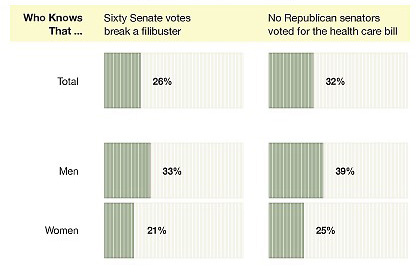Sandbox: Difference between revisions
No edit summary |
No edit summary |
||
| Line 17: | Line 17: | ||
The article provides a link to an [http://pewresearch.org/pubs/1478/political-iq-quiz-knowledge-filibuster-debt-colbert-steele online quiz] at the Pew Research Center website, where readers can test their own knowledge. Of the dozen questions there, the filibuster item had the worst score in the survey. | The article provides a link to an [http://pewresearch.org/pubs/1478/political-iq-quiz-knowledge-filibuster-debt-colbert-steele online quiz] at the Pew Research Center website, where readers can test their own knowledge. Of the dozen questions there, the filibuster item had the worst score in the survey. | ||
Blow suggests that a possible source of all the confusion may be | Blow suggests that a possible source of all the confusion may be people's choice of news outlets. He cites another recent poll which found that Fox News was the most trusted network news in the country, with 49 percent of respondents expressing trust. The ABC, NBC and CBS networks all got less than 40%. The full results from Public Policy Polling organization are available [http://www.publicpolicypolling.com/pdf/PPP_Release_National_126.pdf here.] Not surprisingly, political affiliation appeared to be a key factor. Fox was trusted by 74% of Republican respondents but only 30% of Democrats. By contrast, the other three networks were all trusted by a majority of Democrats but less than 20% of Republicans. According to Dean Debnan, President of Public Policy | ||
Polling, | |||
<blockquote> | |||
A generation ago you would have expected Americans to place their trust in the most | |||
neutral and unbiased conveyors of news. But the media landscape has really changed and now they’re turning more toward the outlets that tell them what they want to hear. | |||
</blockquote> | |||
Submitted by Paul Alper. | Submitted by Paul Alper. | ||
Revision as of 01:17, 2 February 2010
More on the Monty Hall problem.
The Mathematical Gazette,
November 2009
Setphen K Lucas, Jason Rosenhouse
Lost in translation
New York Times, 29 January 2010
Charles M. Blow
Chance News often features examples of innumeracy or statistical illiteracy, but what about political illiteracy? Congress has spent a year debating health care reform, and the stalled legislation was widely discussed in coverage of President Obama's State of the Union address. Nevertheless, in above article we read that: "According to a survey released this week by the Pew Research Center for the People and the Press, only 1 person in 4 knew that 60 votes are needed in the Senate to break a filibuster and only 1 in 3 knew that no Senate Republicans voted for the health care bill."
The above reproduces a portion of an accompanying graphic entitled Widespread Political Illiteracy, which breaks out responses further based on age, education, political affiliation, etc. The results are not encouraging.
The article provides a link to an online quiz at the Pew Research Center website, where readers can test their own knowledge. Of the dozen questions there, the filibuster item had the worst score in the survey.
Blow suggests that a possible source of all the confusion may be people's choice of news outlets. He cites another recent poll which found that Fox News was the most trusted network news in the country, with 49 percent of respondents expressing trust. The ABC, NBC and CBS networks all got less than 40%. The full results from Public Policy Polling organization are available here. Not surprisingly, political affiliation appeared to be a key factor. Fox was trusted by 74% of Republican respondents but only 30% of Democrats. By contrast, the other three networks were all trusted by a majority of Democrats but less than 20% of Republicans. According to Dean Debnan, President of Public Policy Polling,
A generation ago you would have expected Americans to place their trust in the most neutral and unbiased conveyors of news. But the media landscape has really changed and now they’re turning more toward the outlets that tell them what they want to hear.
Submitted by Paul Alper.
